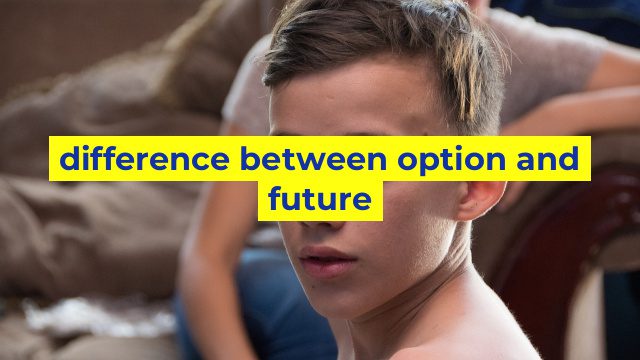Difference Between Options and Futures
Overview
Options and futures contracts are two of the most well-known derivatives traded in financial markets. Derivatives refer to financial instruments that derive their value from an underlying asset or security. Both options and futures contracts are agreements between two parties to buy or sell an underlying asset at a predetermined price and time. Although they are similar in some ways, there are several key differences between options and futures contracts.
Definition and Function
An option is a contract that gives the buyer the right, but not the obligation, to buy or sell an underlying financial asset at a predetermined price and time. This means that the buyer has the choice to exercise the option or not. In this case, the seller of the option must fulfill the contract. Options are typically used to hedge against any downside risk of an underlying asset.
A futures contract, on the other hand, obligates both the buyer and the seller to buy or sell an underlying asset at a predetermined price and time. The buyer has the obligation to take delivery of the asset, while the seller has the obligation to deliver the asset. Futures contracts are typically used to speculate on the direction of the underlying asset.
Pricing
The pricing of both options and futures contracts is complex and depends on several factors, including the current market price of the underlying asset, the time to expiration, and the volatility of the underlying asset. However, in general, options contracts are less expensive than futures contracts because they provide the buyer with the right, but not the obligation, to buy or sell an underlying asset.
Risk and Rewards
Options provide the buyer with the right, but not the obligation, to buy or sell an underlying asset, allowing them to limit their risk exposure. The most that the buyer can lose is the premium paid for the option. On the other hand, the seller of an option has unlimited risk exposure, as they may be required to fulfill the contract if the buyer exercises their right.
Futures contracts, on the other hand, carry higher risk and higher rewards. The buyer and seller of a futures contract are both obligated to fulfill the contract, regardless of the price of the underlying asset at the time of settlement. This means that futures contracts carry a much higher risk of loss, but also the potential for higher profit.
Conclusion
In summary, options and futures contracts are two of the most well-known derivatives traded in financial markets. Though they share similarities, they differ in their definition, function, pricing, and risk or reward profile. Options contracts offer the buyer the right, but not the obligation, to buy or sell the underlying asset, while futures contracts obligate both the buyer and seller to fulfill the contract. The risk and reward profile also varies between these two derivatives. It is important to understand these differences before getting involved in trading either option or futures contracts.
Table difference between option and future
| Option | Future |
|---|---|
| An option is a contract that gives the holder the right, but not the obligation, to buy or sell an underlying asset at a predetermined price and time. | A future is a contract that obligates the holder to buy or sell an underlying asset at a predetermined price and time. |
| Options are traded on exchanges and can be bought or sold at any time during trading hours. | Futures are traded on exchanges and have specific expiration dates and times. |
| The potential loss for an option buyer is limited to the premium paid, while the potential profit can be unlimited. | The potential loss or profit for a futures trader is unlimited. |
| Options can be used for hedging or as a speculative tool. | Futures are primarily used for hedging purposes. |
| Options are more complex, and their pricing is determined by various factors such as time decay, volatility, and interest rates. | Futures are comparatively simpler, and their pricing is determined by supply and demand factors. |
